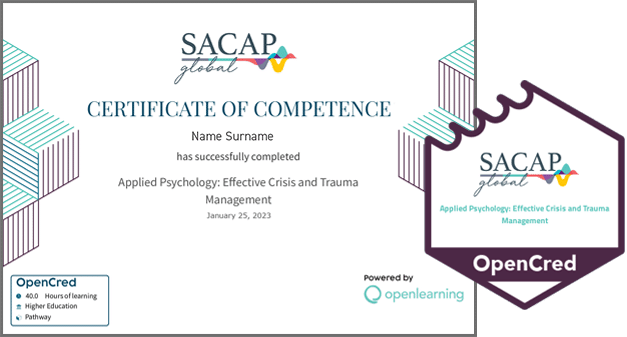Effective Crisis & Trauma Management
R3,080.00

Course Overview
Do you understand which treatments and approaches are most effective in managing post-traumatic stress syndrome?
The Effective Crisis and Trauma Management micro-credential will help you gain a deep understanding of the effects crisis and trauma have on human behaviour – on the person in crisis as well as on the counsellor who is providing support.
In this 4-week course, you will gain a deep understanding of post-traumatic stress syndrome in terms of primary and secondary stress factors. A particular focus is on the negative and profound effects of Rape trauma and Partner violence, understanding reactions to these traumatic events and the impact of trauma on memory.
This course will expand your knowledge and management of crisis and trauma. You will gain a better understanding of the breadth and depth of crisis and trauma to make informed decisions about the most effective treatment options.
Counsellors will gain a comprehensive understanding of the importance of self-care, given the risk of being exposed to secondary trauma while working with those in crisis, as well as exploring compassion fatigue and the potential adverse consequences of working in this field.
Finally, the course looks at the need for sustainable referral strategies as part of an effective crisis and trauma management strategy.
TRIGGER WARNING: This course includes readings, media and discussions around the topic of crisis and trauma, including rape trauma and partner violence. We acknowledge that this content may be difficult and triggering to some. We encourage you to be mindful of your well-being as you process the content.
Note: Counselling skills training is required to assist people in crisis and trauma. This course does not address counselling skills training. It focuses on the context of crises and trauma.
FAQs
What are the entry requirements?
Anyone 18 years of age or older can sign up for this micro-credential course. There are no academic entry requirements or conditions.
Who is this course for?
This course is for anyone who already has counselling skills training and wants to expand their knowledge and understanding of the breadth and depth of crisis and trauma, in order to make informed decisions concerning the most effective treatment options.
What is the time commitment?
A total of 40 hours is required to complete the micro-credential course. An average of 10 hours weekly over 4 weeks.
What do you need to do the course?
- Access to Microsoft Word
- Google Chrome (recommended)
- Stable internet connection
Is the course accredited?
The micro-credential course is not accredited and non-credit bearing.
What is crisis and trauma?
The Cambridge Dictionary defines crisis as “an extremely difficult or dangerous point”. It therefore originates from a specific time or event. Trauma on the other hand is defined as a “severe and lasting emotional shock and pain caused by an extremely upsetting experience.” Read more here.
Course highlights

-
Gain a better understanding of the effects of rape and partner violence.
-
Recognise the importance of self-care as a counsellor given the risk of secondary trauma and chronic fatigue.
-
Effectively manage situations of crisis and trauma.
Dates
- Class of 2025 October: 6 October – 2 November
- Class of 2025 November: 3 November – 30 November
There are no online classes. Course content is released on a weekly basis. This will allow you to work through the course material at a time that is most convenient for you, while still meeting the weekly targets on time.
Learner Experience
Certification
Upon completion, you will receive a digital certificate of competence and a badge. Your certificate and badge can be shared on 100+ social media platforms, allowing you to share your achievement with a single click.

Credential Type
The OpenLearning team has reviewed this course to ensure quality academic learning within the Malaysian and Australian credentialing framework.
An OpenLearning OpenCred is a type of credential that can stand-alone, or it can interact with a formal qualification. OpenCred courses are market-leading online courses aimed at preparing learners for the future of work.
This course has been designed and developed by experts in the field of psychology. The Effective Crisis and Trauma Management micro-credential course is for anyone needing to improve their skills in this area and offers 40 hours of indispensable learning and assessment.
Learners study online with peers and receive robust academic content while acquiring practical industry-relevant skills.
OpenCreds
Completing this course leads to obtaining an OpenCred.
- 40 hours of learning
- OpenCred classification: Pathway
Stackable Credentials
Stack specified combinations of micro-credentials and they can be recognised as equivalent to a module within the Bachelor of Applied Social Science Degree at SACAP. Intro to Crisis & Trauma can be stacked with Symptoms of Crisis & Trauma and Crisis Interventions and Effective Crisis & Trauma Management, and if you meet the minimum entrance criteria, you can enrol for the Bachelor of Applied Social Science Degree and apply for module exemption.

What You’ll Learn
Over the course of four (4) weeks, through videos, readings and discussions, you will explore the following topics:
- Depth perspective: Trauma and Post-Traumatic Stress.
- Depth perspective: Effective Counsellors, Compassion Fatigue and Self-Care.
- Breadth perspective: Rape Trauma and Partner Violence.
- Breadth perspective: Referring those in crisis to another professional.
Course Outcomes
By the end of this course, you will be able to:
- Define the differences between primary and secondary trauma.
- Describe secondary post-traumatic stress.
- Define compassion fatigue.
- Identify the elements which could cause the development of compassion fatigue in counsellors.
- Explain the importance of self-care as a counsellor.
- Identify the characteristics of effective crisis counsellors.
- Demonstrate an understanding of the prevalence of rape and rape trauma syndrome.
- Describe the phenomenology of rape in terms of fear, helplessness and powerlessness, self-blame and feelings of guilt and shame, loss of sexual identity, betrayal and loss of trust, loss of meaning, isolation and alienation, the impact on subsequent health and functioning and post-traumatic stress disorder.
- Discuss the dynamics of partner violence: psychosocial and cultural dynamics, psychological factors, including incidence and prevalence stressors, myths about battering, profiling of the batterer, as well as the cycle of violence and the realities for abused women.
- Describe the steps to be taken when referring a client.
- Identify appropriate referral resources for clients when faced with crisis or trauma.
You will have also created an invaluable portfolio of evidence, which you can use to demonstrate your knowledge and understanding of the breadth and depth of crisis and trauma to make informed decisions about the most effective treatment options.
The Team
The SACAP Global team brings a wealth of knowledge and practical experience across various disciplines. Our expert short course developers and dedicated support team are passionate about sharing their insights to help you get the most out of your online learning journey.





















